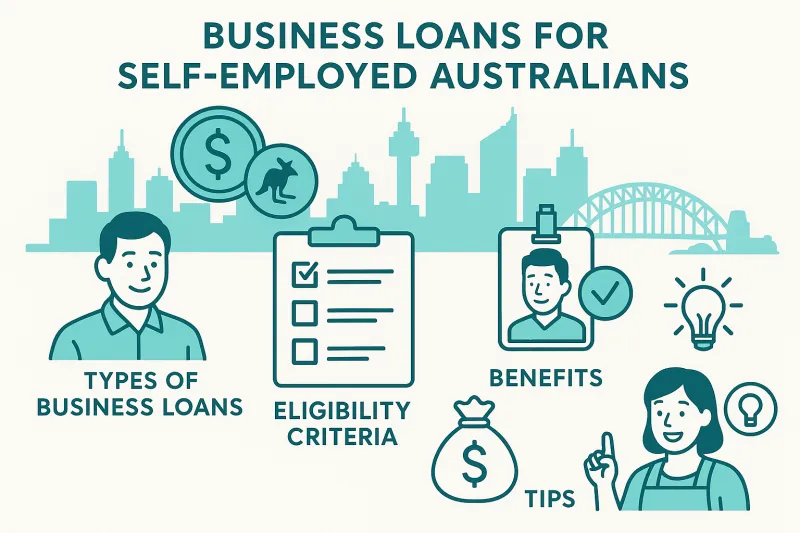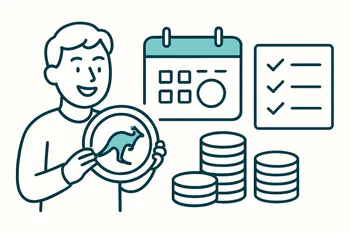A Comprehensive Guide to Business Loans for the Self-Employed in Australia
- Personal Finance
- 03 Mins read

Starting and growing a business while being self-employed in Australia can sometimes feel like an uphill battle. Without the safety net of a regular paycheck, securing funding can be daunting. Yet, with the right strategies, self-employed Australians can access various business loans tailored to their unique needs.
Understanding Business Loans for the Self-Employed
What are business loans? Simply put, these are funds lent to you by a bank or financial institution to be used specifically for business purposes. As a self-employed individual, you might need a loan to invest in equipment, manage cash flow, or expand your operations.
"In my ten years as a mortgage broker, I've seen countless self-employed Australians grow their ventures with the right financial tools," says Nathan Smith, Finance Author.
Why Consider a Business Loan?
For the self-employed, access to capital is crucial. A business loan can provide the working capital needed to cover short-term expenses or invest in growth opportunities. Here are some reasons why you might consider taking out a business loan:
- Expansion: Whether opening a new store or launching a new product line, expanding operations often requires a financial boost.
- Cash Flow Management: Seasonal businesses or those affected by fluctuating markets can use loans to stabilize their finances.
- Equipment Purchase: Up-to-date equipment can improve productivity and competitiveness.
Eligibility Criteria
Business loans typically have several eligibility criteria, but don't be intimidated. Many lenders, especially online ones, tailor their products specifically for the self-employed. Generally, you will need:
- Business Financials: This includes bank statements, tax returns, and a profit & loss statement for at least 12 months.
- Credit Score: A good credit score can open more doors, but some lenders are flexible.
- Proof of Business Activity: Demonstrating ongoing business operations is crucial.
Pro Tip: Keep detailed records of all your business activities. This data can be invaluable when negotiating loan terms with a lender.
Different Types of Business Loans
Here are some options available for self-employed Australians:
- Secured Business Loans: These loans require collateral. Offering an asset reduces the lender's risk and can result in lower interest rates.
- Unsecured Business Loans: No collateral is necessary, but these may come with higher interest rates. Ideal if you lack asset security.
- Line of Credit: Similar to a credit card, you borrow as needed up to a certain limit. Great for managing cash flow.
Benefits of Business Loans
Taking out a business loan can have several advantages:
- Growth Opportunities: Allows you to seize new opportunities you couldn't otherwise afford.
- Manageable Repayment Terms: Many lenders offer flexible repayment options that can align with your cash flow.
- Tax Benefits: In many cases, interest on business loans can be tax-deductible.
Tips for Securing Funding
Securing a business loan as a self-employed individual involves careful planning:
- Improve Your Documentation: Lenders appreciate clear, organized financial documents showing your income and expenses.
- Understand Your Needs: Know exactly how much you need and why. A clear plan increases your chances of acceptance.
- Shop Around: Different lenders offer different terms and rates. Don't settle for the first offer you receive.
- Prepare for a Meeting: Be ready to discuss your business plan and demonstrate how you plan to use the funds effectively.
Common Pitfalls and How to Avoid Them
Navigating the loan process can be tricky. Here are some common mistakes to watch out for:
- Over-borrowing: Take what you need, not what you want. Large loans come with heavy financial commitments.
- Ignoring Small Print: Always read the terms and conditions. Watch out for hidden fees or variable interest rates.
Notice: Protect Your Financial Health
Before committing to any loan, ensure you fully understand the terms and can afford repayments. Unexpected changes in income can affect your ability to repay. Always consult with a financial advisor if in doubt.
Case Study: Sarah's Journey to Expansion
Sarah, a self-employed graphic designer in Sydney, wanted to expand her home office. By securing a small loan, she invested in cutting-edge technology and hired an assistant. The business has since thrived, and Sarah repaid the loan in two years. Her story is a testament to the power of strategic financial planning.
Final Thoughts: Empower Your Business
Taking out a business loan can be a game-changer for the self-employed. With the right approach and careful planning, these loans serve as a springboard for growth and success. Conquer the hurdles of self-employment by arming yourself with financial literacy and optimism.



